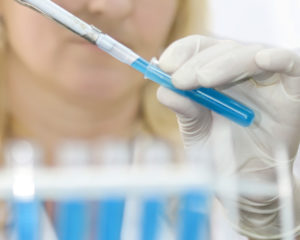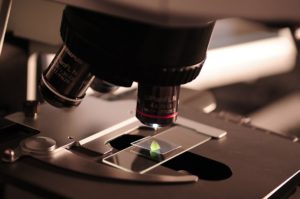Cancer vaccines are a type of immunotherapy, and can be generally categorized into autologous or non-autologous. Autologous are considered veterinary cancer vaccines which are derived from a patient’s own tissue, whereas non-autologous may use common tumor antigens or allogeneic approaches to stimulating the immune system against cancer.
Veterinary Cancer Vaccines
Veterinary Cancer Vaccines – Overview

Autologous Cancer Vaccines and Veterinary Immunotherapies
Veterinary Autologous Immunotherapy: Autologous cancer vaccines and autologous therapeutic products are typically regulated by USDA-Center for Veterinary Biologics per 9CFR 101.1 the Autologous Prescription Products or autologous therapeutic biologics provided these veterinary autologous products act primarily through the immune system or result in an immunological response.
What is an Autologous Vaccine? An autologous veterinary cancer vaccine is a type of personalized vaccine that is created using a patient’s own cancer cells. The goal of this type of vaccine is to stimulate the patient’s immune system to recognize and attack the cancer cells. Autologous veterinary cancer vaccines are often created by taking a portion of the patient’s tumor and then further processing this tumor tissue to create a vaccine. Certain types of veterinary cancer vaccines use tumor lysate, which is created by breaking down the tumor tissue and removing cells and extracellular material, yet preserving the fraction which contains tumor specific antigens. The tumor lysate can be further modified or combined with substances, such as adjuvants, which seek to stimulate the patient’s immune system against the tumor specific antigens contained in the tumor lysate. Other techniques take a patient’s white blood cells along with the tumor, and modify the white blood cells to attack the tumor. The vaccine is then injected back into the patient to stimulate an immune response against the tumor. The objective of autologous veterinary cancer vaccines is to provide a long-lasting, tumor specific immune response against the cancer cells, which may lead to improved outcomes for patients with cancer.
How do Autologous Veterinary Cancer Vaccines Work? Since cancers may have unique signatures, such as patient tumor specific antigens, cancer vaccines derived from a patient’s own tumor cells are intended to provoke a patient specific immune response against their own tumor cells. Cancer vaccines based on this autologous approach have also been used with other drugs or biologics, such as checkpoint inhibitors or chemotherapeutic agents, in an effort to provide multi-modal therapy against the pet’s cancer.
Neo-antigen Dog Cancer Vaccine
Recently, a new cancer vaccine (non-autologous) for dogs has been developed and is in clinical trials. Unlike cancer vaccines which are autologous in nature, this new vaccine is based on mutations which are common among various cancers which occur in dogs. This vaccine is based on neo-antigens (errors) which are produced during RNA transcription and splicing. These errors can produce frameshift antigens which the immune system may recognize. The vaccine incorporates these neo-antigens and in theory may provide a preventative vaccine for canine cancer. More information can be found at Calviri.
YouTube: A vaccine against cancer? These dogs are the first patients | Mission Ahead: CNN Business
Canine Melanoma Vaccine
There is a therapeutic DNA-based vaccine for canine melanoma. A DNA-based vaccine is based on the cancer’s genetics, and helps the immune system recognize a protein on melanoma tumor cells. More information about the canine melanoma vaccine can be found here: Canine Melanoma Vaccine.
Common Terminology
Neoantigens are novel antigens produced as a result of genetic mutations and may cause changes in the structure of proteins expressed on the cell surface, which can then be recognized as foreign by the immune system. In cancer, these neoantigens are often specific to the individual’s tumor and are not present in normal tissues. As a result, they can be targeted by the immune system, leading to the generation of T cells that specifically recognize and attack the cancer cells. Neoantigens have received significant attention in the field of cancer immunotherapy, as they offer the potential for the development of personalized treatments that target the unique features of an individual’s tumor.
Adoptive immunotherapy is a type of cancer treatment involving the transfer of immune cells from one individual to another (allogenic) or from the patient themselves (autologous cells). The goal of adoptive immunotherapy is to increase the number and activity of immune cells that can recognize and attack cancer cells. Adoptive immunotherapy can take several forms, including:
- T cell therapy: T cells are collected from the patient or a donor and are then modified or engineered in the laboratory to enhance their ability to recognize and attack cancer cells. These modified T cells are then infused back into the patient.
- Natural killer cell therapy: Natural killer (NK) cells are a type of immune cell that can directly kill cancer cells. NK cells can be isolated from the patient or a donor and expanded in the laboratory, and then infused back into the patient.
- Chimeric antigen receptor (CAR) T cell therapy: CAR T cells are T cells that have been engineered to express a receptor on their surface that specifically recognizes a protein on the surface of cancer cells. CAR T cells can be isolated from the patient or a donor, modified in the laboratory, and then infused back into the patient.
CAR T cell therapy is a type of adoptive immunotherapy that uses genetically modified T cells to treat cancer. T cells are collected from the patient and then modified in the laboratory to express a chimeric antigen receptor (CAR), a type of protein that recognizes a specific antigen on the surface of cancer cells. After the CAR T cells have been created, they are then infused back into the patient where they multiply and target cancer cells that express the antigen recognized by the CAR.

Links to Veterinary Cancer Vaccine Publications
The Safety of an Adjuvanted Autologous Cancer Vaccine Platform in Canine Cancer Patients
Veterinary Cancer Vaccine Regulations:
Veterinary cancer vaccines which work through immune modulation are regulated by the United States Department of Agriculture’s Center for Veterinary Biologics (USDA CVB).
Autologous veterinary cancer vaccines are categorized as Autologous Prescription Products (APP).